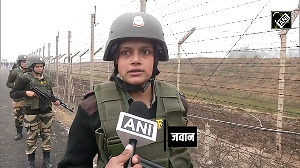Disappointed with the court verdict in the Bhopal gas tragedy case, activists, who have been fighting for justice for the families of victims, said on Monday that the eight people have been convicted on "diluted" charges and they will appeal before the high court.
Eminent lawyer K T S Tulsi agreed with the activists, saying that the investigating agencies as well as prosecutors "mishandled" the case and judges acted like a "recording machine".
"It is the sheer incompetence of investigators as well as prosecutors. They must share the blame. In a trial like this, the judges ought to have made up the deficiency, directed further investigation and ought not have become merely recording machines," Tulsi said. He said even the press was not vigilant enough to prevent an attempt to cover-up the role of the accused in the case.
"In every case, where rich and powerful are involved, there is an attempt to cover-up. The question is why did it happen so conveniently? Why was the press not so vigilant?" he said, adding, that justice has not been done in this case.
"It is the obligation of the judiciary that people get justice. Unfortunately, in this case they have not got justice," Tulsi said.
An activist said that the industrial disaster has been converted into something like a traffic accident.
"People are extremely disappointed because a lot of them did not know that the charges are diluted. Now, they find that the disaster, which was the world's worst industrial disaster, has been converted into something like a traffic accident," Sarangi of the Bhopal Group of Information and Action, an activist involved with the case for two decades, said.
The activists said they would appeal before the high court till all the accused are punished under stringent provisions of law.
The court convicted 85-year-old former Union Carbide Chairman Keshub Mahindra and seven others in the case relating to leakage of deadly methyl isocyanate gas in the intervening night of December 2 and 3, 1984.
They were held guilty under Sections 304-A (causing death by negligence), 304-II (culpable homicide not amounting to murder), 336, 337 and 338 (gross negligence) of the Indian Penal Code.
However, there was no word on Warren Anderson, the then chairman of Union Carbide Corporation of the US, who was declared an absconder after he did not present himself before the court for the trial that began 23 years ago.
"The documentary evidence is there to show that the way back in 1973, Warren Anderson was fully aware and actually approved the untested technology to go to Bhopal and that he was aware that it was hazardously designed and planned in an unsafe location that was being run in an extremely unsafe manner," Sarangi said.
Another activist N D Jayaprakash said that an appeal would be filed before the high court.
"As soon as we get the copy of the order, we will file an appeal before the high court because at least they have to be punished under Section 304. This is culpable homicide because the accused knew very well that they were using and storing chemicals, which, if mishandled would prove to be a huge disaster," he said.
Jayaprakash alleged that the accused did not use the best safety procedure available.
Other activists demanded stringent punishment for all the accused including Anderson for the Bhopal gas tragedy.







 © 2024 Rediff.com -
© 2024 Rediff.com -